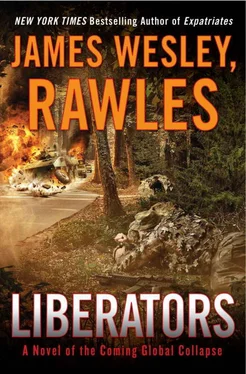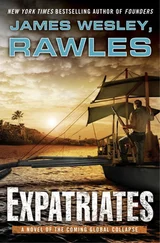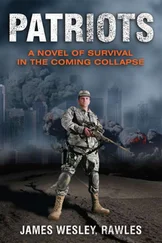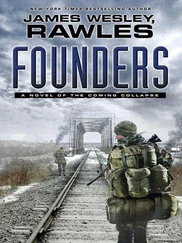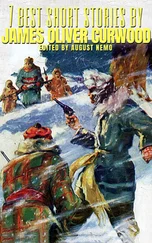Megan asked, “So folks are law-abiding here?”
“Yes, indeed. You will find that Driggs is a world apart from Dubois. There’s a famous retired actress who is the mayor here. She now has the nickname Mayor Furiosa. But that’s kind of a joke since she believes in constitutional government.”
Joshua asked, “With winter coming on, there’s no way that we can make it all the way to northern Idaho on foot. Is there anywhere near here where we could find work?”
“What are your skills?”
“I’m a former Air Force security cop and NSA security officer, my wife is a former Marine and NSA intelligence analyst, and her sister was a millwright and mechanic.”
“Do you folks know how to shoot?”
“Yes, quite well.”
“Well, there are some big ranches up the valley that might need a mechanic and a security guard or two.”
“Where should we ask?”
“Up in Alta. That’s about six miles east of here. There are a lot of wealthy ranchers and retirees up that way. But for tonight, I can put you folks up at my house. I wouldn’t want you camping out in weather like this.”
• • •
The small town of Alta was just across the Wyoming state line. Alta was preferred by some of the more wealthy residents of the Teton Valley because Wyoming had no personal income tax. Many of these families had been preparedness-minded before the Crunch, and hence were well stocked.
They learned that there was only one church in Alta: St. Francis of the Tetons Episcopal Church. An Adventist church used the same building on Saturdays. (People from around Alta who were of other religious affiliations attended various churches in Driggs, up until gasoline became unavailable.)
The elevation in Alta was 6,400 feet, making it a slightly colder, snowier climate than Driggs, which was at 6,100 feet. Driggs had a population of 1,675, while Alta had just under 400. Driggs was the county seat of Teton County, Idaho, while Alta, Wyoming, was ostensibly still policed by the Fremont County Sheriff’s Department. With the deep rift between Lander, Wyoming (the county seat), and the outlying sheriff’s offices in Jackson and Dubois, the residents of Alta considered themselves self-policing. As one resident put it, “We’re a libertarian enclave, sort of like Galt’s Gulch.” If a Fremont County Sheriff’s Department vehicle were to drive through Alta, Joshua surmised it would probably be engaged with rifle fire.
There seemed to be very little commerce going on in Alta. There was a sign up in one disused parking lot that read, FARMERS MARKET & SWAP MEET 10:00 A.M. TO DARK ON SATURDAYS. But that wasn’t much help since it was Tuesday, so they made inquiries at the Alta Branch Library. The librarian suggested that they look for work at the Sommers ranch, which was less than three miles north of town. The librarian said, “They’ve lost two of their sons so they’re short-handed.”
The walk to the Sommers ranch was memorable. The ranch was on Alta North Road. It started to snow as they trudged down the road. They began praying aloud as they walked. There was a burst of sunlight just before they reached the mailbox. They decided that it would be Megan who would approach the ranch house alone, since she was the savviest negotiator. They didn’t want to alarm the residents by arriving as a group. While the others waited at the mailbox, Megan walked up the house, which was nine hundred yards away.
A woman named Tracy Sommers answered the knock on the door. Megan and Tracy spoke with each other for ten minutes through the intercom before Tracy opened the door, with a big Colt Anaconda .44 Magnum in her hand. Ron Sommers was behind her, holding an M2 Carbine. Their conversation continued through the open door as it started to snow again.
It was not until after they had made eye contact, and after Megan had spoken the magic words former Marine , that she was invited inside. They talked for another twenty minutes before Tracy said, “Your husband, sister, and sons must be freezing their tails off. Go fetch them.”
The deer carts were soon dripping dry in the garage, and Joshua’s party was warming themselves near the Sommerses’ big Hearthstone Equinox woodstove.
The Sommerses were in their late fifties. They had one adopted grandson who was living at home. His name was Chad, and he was nine years old. (Their estranged daughter, who was a drug addict living in Dallas, Texas, had dropped off the roly-poly grandson with them six years earlier, and they had not heard from her since. Chad formally became their ward just before the Crunch.) Ron Sommers tearfully described how one of his two sons had died of a burst appendix at age twenty-six, six months after the Crunch. His other son had never returned from college at Norwich University, Vermont, where he was in his junior year. With no word from him, he was presumed dead.
As they continued talking, Chad brought out a plastic tote bin and was quietly building Legos with Leo and Jean. Tracy apologized for not having any coffee or sugar, but she did have some tea bags. She brought out mugs to fill with hot water from the teapot that was constantly on the woodstove.
Oddly, there was no formal interview or job offer for Joshua’s party. Their three-hour conversation with the Sommerses just gradually shifted toward their new responsibilities at the ranch and what bedrooms they would be sleeping in. They were hired.
The ranch was a 320-acre rectangular half section. They raised registered Black Angus. They had no bull of their own (they had used artificial insemination for breeding before the Crunch), but they now had the use of a loaner Angus bull from the other side of Driggs to cover their twenty-five cows, in exchange for one weaned calf per year—with steer calves and heifers in alternating years. Although it would have been better to have their own unrelated bull to ensure that every cow was bred, they lacked a bullpen. Building a bullpen was on Ron’s lengthy to-do list.
Ron was a former Marine Corps 3002 ground supply officer, who after leaving the service worked agricultural credit and later in investment banking. Their move to the ranch in 2011 was the fulfillment of a lifelong dream.
The Sommerses’ ranch house sat on a bench that had been cut on a shallow slope. The main barn sat on another terrace slightly above and beyond it, and the open-sided hay barn, beyond that. The elevation of the ranch was 6,420 feet at the west end, and nearly 7,000 feet at the heavily timbered east end. They had sixty acres of cultivated hay ground, and the rest was in pasture and timber.
West of the house was a six-hundred-square-foot hand-built greenhouse that had been constructed over a framework that was originally designed for a small pole barn. Ron called their greenhouse the Monstrosity. Ron had built it just after the Crunch began, using dozens of used windows that had come from condemned buildings—mostly old trailer houses. The roof was covered in corrugated translucent roofing plastic. The west, east, and south walls of the building were covered in an odd assortment of old window units with various-color frames. Very few of the window panes matched and they were pieced together like a quilt work, with four-by-fours and scraps of corrugated translucent roofing plastic in between. Only the north wall of the greenhouse was solid and insulated. The greenhouse was drafty and leaked badly whenever the snow and ice melted, but it had kept them well fed since the Crunch. Tracy kept the greenhouse garden going year-round. A rusty old woodstove in the center of the greenhouse was kept burning continuously from November to April of each year.
The water for the house and barn was gravity fed. The only electricity was provided by a pair of fifty-five-watt PV panels, which charged a bank of eight golf-cart batteries, cabled together series-parallel in a system that Ron had crafted after the Crunch. Because it had no proper charge controller, the system had to be watched closely in the summer months to prevent overcharging the batteries and boiling off their distilled water. This battery bank was used primarily for charging smaller batteries, powering the intercom, and charging Ron’s assortment of DeWalt power tools. It also provided power for intermittent use of their CB radio, which was their only link to the outside world.
Читать дальше
